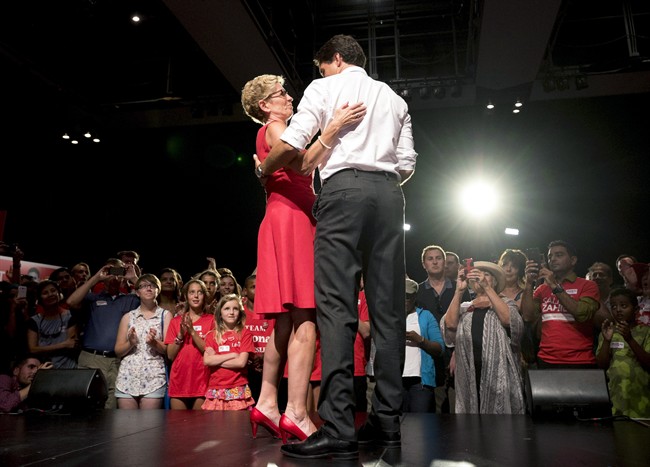As Parliament resumes, the Trudeau government officially hits middle age — two years in, two years to go until the next federal election.

Midlife is traditionally time to take stock, to ask what we’ve accomplished, what’s left to do and how much time we have left before the kids (or, in the political context, voters) pack us off to the retirement home.
Such introspection can lead to that other symptom of advanced middle age: the mid-life crisis. But this government doesn’t seem to be in the market for a sports car or hair plugs; if anything, Trudeau is doubling down on the current list of commitments, from planned changes to small business taxation to cannabis legalization. With a slew of promises to keep, the Liberals are damning the torpedoes, deploying time allocation and closing their eyes and ears to the howls not only of the opposition but of an increasing number of Canadians who question whether this rush to pass legislation is about good government or mere political expediency.
Nowhere is this more evident than with the marijuana file. Trudeau’s promise to legalize recreational cannabis use was a cornerstone of his last election platform — not just in substance, but in style. It drew a clear line in the sand between him and both Tom Mulcair and Stephen Harper: modern vs. traditional, young vs. old, hip vs. square. Harper railed against the dangers to children: “If we sell marijuana in stores like alcohol and tobacco, that will protect our kids? No one believes that.” Mulcair sounded a note of caution: “We are on track to full legalization, but it is more complicated than snapping your fingers. We are not going to have weed being sold at the LCBO tomorrow morning.”
Trudeau, in contrast, promised to work on legalization “right away” and said that it could happen anywhere from a month to a “year or two” into a Liberal government.
Two years in, legal pot remains a pipe dream for users, and for those who voted for that promise. Trudeau’s new deadline is July 1, 2018, or even before that, if legislation passes quickly enough.
But even if Parliament enacts the Liberals’ two bills, the matter may remain stuck in the weeds because the heavy lifting on sale, health and public safety lies with the provinces — a fact Trudeau knew full well when he made his pledge. And while this presents problems for implementation, it also gives Trudeau an out at election time; he can always shove the blame onto the provinces’ plates as long as one big player — Ontario — gets its act together.
Ontario has been the first out of the gate in terms of sale, announcing last week that it will create the Cannabis Control Board of Ontario, a subsidiary of its Liquor Control Board, to distribute the product in 150 government-owned stores and online. This week, the province toughened its laws on driving under the influence of drugs, bringing in a zero-tolerance policy for drivers aged 21 and under, the same as for alcohol. “The province,” said Ontario Attorney General Yasir Naqvi, “is moving forward with a safe and sensible approach to legalization that will ensure we can keep our communities and roads safe, promote public health and harm reduction, and protect Ontario’s people.”
And make no mistake: The plan here is to protect federal Liberal votes, not just in Ontario but across the country. As long as Ontario gets its recreational cannabis regime up and running in time, Trudeau can point to it and say, effectively, ‘If Queen’s Park can do it, what’s Victoria’s problem? What’s holding Quebec back?’ Ontario Premier Kathleen Wynne’s success is critical to Trudeau’s and represents another extension of her early support of Trudeau’s political career. Trudeau already repaid part of that debt early on by topping up CPP payments — which allowed Wynne to back down on her costly pension proposal, leaving more money for other voter-friendly policies such as free university tuition and pharmacare for those under 25.
Wynne really needs to collect on the rest of that debt next June, when she faces the voters in the next provincial election. With most Ontarians looking for a change of government, she needs all the help she can get. She’ll get it as long as she can help the prime minister keep a signature campaign promise.
Lost in these electoral calculations are more mundane questions of law and order — the concerns expressed by police services which fear they won’t be ready to enforce the law, a Canadian Medical Association which wanted a legal age of 21 (Ontario is moving ahead with 19) and the caution expressed by the leader of the federal task force on marijuana, Anne McLellan, who last year said it’s critical that Canada “go slow” on reforming marijuana laws.
Trudeau isn’t listening to voices of reason on this one. Once a government hits middle age, fears of mortality trump common sense — and getting to the bottom of that bucket list becomes the only thing that matters.
Tasha Kheiriddin can be heard between noon and 2 p.m. ET on Toronto Talk Radio AM640. She’s also a columnist with Global News and iPolitics.ca, where this piece first appeared.












Comments